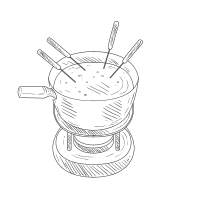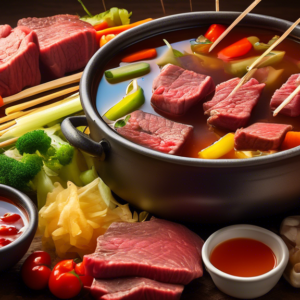How to Cook Beef Fondue
Few dining experiences are as interactive and enjoyable as beef fondue. This communal meal, where everyone cooks bite-sized pieces of tender beef to their liking in a shared pot of simmering oil or broth, is perfect for gatherings and special occasions. The beauty of beef fondue lies not just in its delicious simplicity but also in its versatility. With a variety of dipping sauces and side dishes, the flavor combinations are endless.
Choosing the Right Beef for Fondue
Selecting the right cut of beef is paramount for a successful fondue experience. You want meat that’s tender enough to cook quickly and evenly in the fondue pot while remaining juicy and flavorful. Here are some prime cuts to consider:
- Tenderloin: Known for its buttery texture and melt-in-your-mouth tenderness, tenderloin is an excellent choice for fondue. Its mild flavor pairs well with a wide array of sauces.
- Sirloin: Sirloin offers a good balance of tenderness and flavor. Look for top sirloin, as it tends to be more tender than other sirloin cuts.
- Ribeye: Ribeye is a flavorful and well-marbled cut that’s perfect for those who prefer a richer taste. Due to its marbling, it remains moist even when cooked to higher temperatures.
- New York Strip: Similar to ribeye in terms of flavor, New York strip is another excellent option. It’s known for its tenderness and slightly chewy texture.
Preparing the Beef
Once you’ve chosen your cut, it’s time to prepare the beef for fondue:
- Trim Excess Fat: While some marbling is desirable, remove any large pieces of fat to prevent excessive splattering in the fondue pot.
- Cut into Bite-Sized Cubes: Cut the beef across the grain into cubes roughly 1-inch in size. This ensures even cooking and makes it easy to spear with fondue forks.
- Pat Dry: Pat the beef cubes dry with paper towels. Excess moisture can lower the temperature of the oil or broth, resulting in uneven cooking.
- Chill (Optional): For optimal tenderness, consider chilling the beef cubes in the refrigerator for 30 minutes before cooking. This helps them hold their shape better during cooking.
Fondue Fueling: Oil vs. Broth
The traditional cooking medium for beef fondue is heated oil, but broth is an equally delicious and slightly lighter alternative. Here’s a breakdown of each option:
Oil Fondue
Oil fondue delivers a crispy, flavorful crust on the beef. Choose an oil with a high smoke point, such as canola, peanut, or grapeseed oil. Heat the oil to 350-375°F (175-190°C) before adding the beef.
Broth Fondue
Broth fondue offers a lighter and more savory flavor profile. Use a flavorful broth, such as beef, chicken, or vegetable broth. Bring the broth to a simmer before adding the beef.
Dipping Sauces: The Flavor Enhancers
Dipping sauces are where you can let your culinary creativity shine. They add another dimension of flavor to the fondue experience. Here are some classic and creative options:
- Classics: Horseradish cream, béarnaise sauce, garlic butter, blue cheese dressing.
- International Flair: Teriyaki glaze, chimichurri sauce, peanut sauce, sweet chili sauce.
- Creamy Delights: Honey mustard sauce, creamy mushroom sauce, roasted red pepper dip.
Side Dishes: The Perfect Complements
A well-rounded fondue experience includes an array of side dishes that complement the rich flavors of the beef. Consider serving:
- Starches: Crusty bread, roasted potatoes, rice pilaf, mashed potatoes.
- Vegetables: Steamed broccoli, asparagus spears, roasted Brussels sprouts, sautéed mushrooms.
- Salads: Green salad, Caesar salad, Caprese salad.
Tips for a Successful Beef Fondue
Follow these tips to ensure a memorable and enjoyable beef fondue experience:
- Don’t overcrowd the pot: Cook the beef in small batches to ensure even cooking and prevent the temperature from dropping too much.
- Use separate forks: Provide each guest with their own set of fondue forks—one for cooking and one for dipping.
- Mind the temperature: Monitor the temperature of the oil or broth and adjust the heat accordingly. Overheating the oil can be dangerous.
- Get creative with flavors: Experiment with different cuts of beef, marinades, dipping sauces, and side dishes to create your own signature fondue experience.
- Most importantly, have fun: Fondue is all about gathering with friends and family and enjoying a delicious and interactive meal together.

